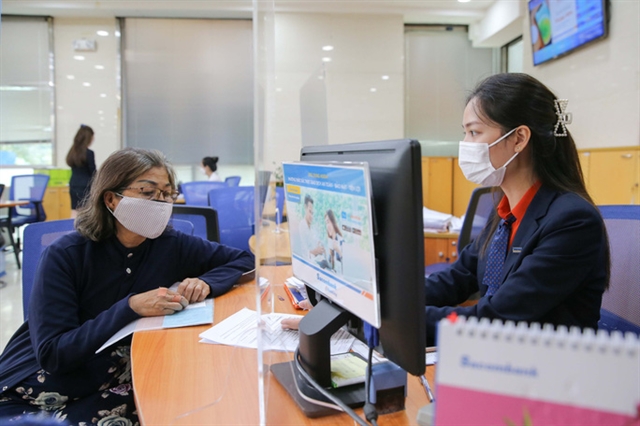 Economy
Economy

 |
| A customer at a bank in Hà Nội. The financial services sector ranked second in terms of M&A investment in the first half of 2022. Photo nld.com.vn |
HÀ NỘI — Mergers and acquisitions (M&A) in the banking industry are expected to remain high for the rest of the year as the industry continues the digital transformation process, according to experts.
According to PricewaterhouseCoopers (PwC), the financial services (FS) industry’s need for digital capabilities, combined with sustained pressure from regulators and disruption from platforms and fintechs, means M&A will continue to be a driver for transformation.
It also explains why FS is second only to technology, media and telecommunications (TMT) in terms of M&A investment, accounting for almost a quarter of deal value in the first half of 2022. A continued focus on technology, the growing demand for sustainable investment options, and lower valuations will keep M&A activity high during the second half of this year.
Ong Tiong Hooi, PwC Vietnam’s Partner, said: “Despite macro-economic headwinds, 2022 will be another robust year for M&A transactions in Việt Nam. M&A activities continue to attract a lot of attention from foreign investment funds. We're seeing an acceleration of strategic decisions to enhance portfolio optimisation, as dealmakers divest to free up capital to focus on acquiring capabilities and transforming core business areas through M&A."
According to Ong, Việt Nam's economic recovery remains strong with GDP growth for 2022 forecast at 6.5 per cent, much higher than the growth forecast for the Asia Pacific region at 4.4 per cent.
In addition, he said, with supportive regulations and policies for investors, the second half of 2022 is providing an opportunity for dealmakers to reassess strategy and act boldly.
"Dealmakers are adapting to a new business climate in which, short-term volatility in financial markets, inflationary pressures, rapidly rising interest rates, supply chain disruptions and geopolitical tensions all appear to be developing into longer-term trends.
"That is the time for true leaders and best-in-class dealmakers to make bold moves and set the stage for the next five years, meeting the targets that matter most to their business or portfolio. M&A could be the way to pursue opportunities that deliver value in a challenging economy."
Yoshisawa Toshiki from Aozora bank also said M&A activities will increase sharply after the pandemic, of which M&A in finance and banking in Việt Nam will be better, thoibaonganhang.vn reported.
Currently, the Vietnamese Government has policies such as equitising State-owned enterprises and banks, and restructuring weak, undercapitalised and substandard banks. This is an opportunity for foreign organisations to make investments. Japan’s medium-sized banks are also considering the financial market and M&A in Việt Nam, Toshiki said.
A banking expert, who declined to be named, also shared there are many factors expected to attract foreign investors to M&A activities in the near future. Despite being under a lot of pressure, Việt Nam is still controlling inflation well, while economic growth is recovering strongly with high consumer demand. When the economy grows positively, banking activities also prosper as banks are able to expand their credit and boost retail activities.
In order to increase the attractiveness for foreign investors to participate in M&A deals in the banking sector, experts recommended the Government loosen the foreign ownership room in domestic banks. Expanding foreign ownership not only helps banks increase capital but also makes foreign investors feel secure to invest more in the Vietnamese market. However, the expansion should be given only to reliable foreign investors, who have been proven as large banking and financial institutions in developed countries.
According to experts, with transparent and reputable financial institutions, if their ownership rate increases, they can use their financial and governance strengths to help domestic banks recover well and ensure healthy development. Vice versa, if their ownership rate is too low, they will not focus much on the banks to enable significant changes. — VNS




